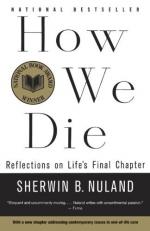
|
| Name: _________________________ | Period: ___________________ |
This quiz consists of 5 multiple choice and 5 short answer questions through Chapter 7.
Multiple Choice Questions
1. What does TIA stand for?
(a) Transient ischemic attack.
(b) Transient irregular achievement.
(c) Total ischemic attack.
(d) Tubercular incendiary attack.
2. What term from Chapter 6 refers to something pertaining to or symptomatic of agony, especially paroxysmal distress, as the death throes?
(a) Myocardial infarction.
(b) Agonal.
(c) Finite.
(d) Pandemic.
3. Harold Bliss was the first documented case of death by what means?
(a) Radiation exposure.
(b) Electrocution.
(c) Automotive accident.
(d) Allergic reaction.
4. How many years had Dr. Nuland spent in the medical profession when How We Die: Reflections on Life's Final Chapter was published?
(a) Over 20.
(b) Over 50.
(c) Over 40.
(d) Over 30.
5. All but how many names were changed in the stories shared by the author in How We Die: Reflections on Life's Final Chapter?
(a) 9.
(b) 1.
(c) 6.
(d) 4.
Short Answer Questions
1. What is the second of the seven most common causes of death for 85% of the elderly population, as discussed in Chapter 4?
2. How did Katie Mason die, according to the author in Chapter 6?
3. In what year did Harold Bliss die?
4. Where was William Osler born?
5. What is the first of the seven most common causes of death for 85% of the elderly population, as discussed in Chapter 4?
|
This section contains 218 words (approx. 1 page at 300 words per page) |

|




